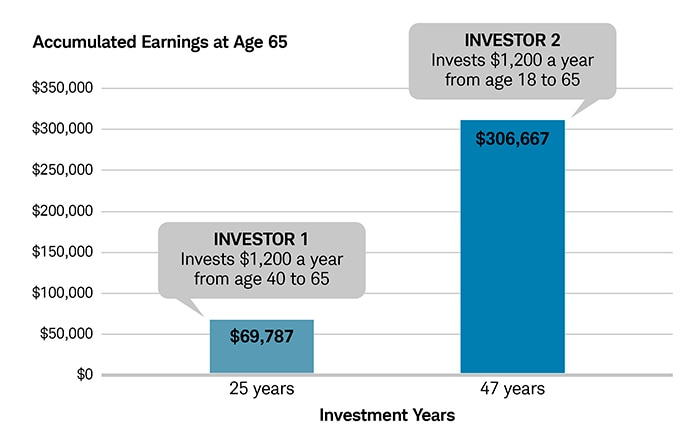Help Your College Grad Become an Investor

Finding the right gift for a college graduate can be tough. It's nearly impossible to pick out the latest gadget—let alone the latest fashions—and giving just cash may strike you as too impersonal. So, what can you give a young person, just starting out, that would be useful and meaningful?
Consider opening up the world of investing.
Many young people find the idea of investing intimidating or figure they'll wait until they have more money to put away. That's a shame, because they often miss out on one of the most powerful drivers of return: time in the market. Compounding can have a substantial impact on the value of money, and the earlier your college grad starts investing, the greater the potential benefit.
Compounding makes a lifelong difference

Source: Schwab Center for Financial Research
This example is for illustrative purposes only and does not indicate or guarantee future performance. It is not intended to represent a specific investment product. Assumes 6% average annual growth and does not account for any fees, costs, or taxes. The actual annual rate of return and values will fluctuate with market conditions.
Here's another way to think about it. Suppose you have $1,000 earning 5% per year. That's $50 per year, which is maybe not that impressive. But then it starts to compound. After that first year at 5% interest, you now have $1,050. Add the same 5% interest, and you get $52.50 the second year for a total of $1,102.50. In the third year your total grows to $1,157.63 ($1,102.50 x 1.05). Yes, the extra gains over and above the original $50 in interest are small at first, but they pick up steam as time goes on. And the more time your graduate gives their investments to grow the greater their potential return will be many years down the road.
But how can you help a young person start down the path to a lifetime of investing and saving? Consider the following gift ideas:
1. Match savings contributions
Saving can be hard to do on a small salary, but it's an important skill to learn. Encourage your new graduate to open a savings account to stash away money for an apartment, a new car, or some other goal—and as an incentive, make the initial deposit and offer to match a portion of their contributions.
Keep in mind that taxes may apply on gifts, depending on the amount gifted. In 2023, you can give up to $17,000 per recipient ($34,000 if you're giving as a couple) without reducing your lifetime gift exemption (currently $12.92 million if you are a single filer and $25.84 million for couples). Check with your tax advisor or the IRS website for more information.
2. Fund an IRA
Help your new grad open a tax-advantaged individual retirement account (IRA) to jumpstart their retirement investing. IRAs can be effective savings tools, especially if your grad isn't yet working for a company that offers a workplace retirement plan like a 401(k).
Roth IRAs, which are funded with after-tax dollars and offer tax-deferred growth and earnings—as well as tax- and penalty-free withdrawals in retirement1—are particularly practical for younger investors, who are likely to be in a lower tax bracket today than they will be in retirement.
Roths also provide flexibility, since contributions can be withdrawn at any time without tax or penalty.2 However, grads should be encouraged to keep the funds invested for retirement.
One thing to keep in mind is making sure the graduate has earned income that's greater than or equal to any contributions made to the account. You'll also want to consider the potential gift tax liability unless funding the IRA is your only gift to them, since the annual gift-tax exclusion is greater than the maximum allowable IRA contribution ($6,500 in 2023 for all under 50).
Note: Beginning in 2024, the SECURE 2.0 Act will allow a lifetime rollover of up to $35,000 of 529 account assets into a Roth IRA. The IRS will still need to establish the "how" by 2024, but this can be another option if you want to help fund a Roth IRA for your college grad in the future, especially if you have unused assets in a 529 and no more children to spend it on.
3. Give stocks with youth appeal
The stock market can be intimidating to young people, who often don't know where to start. The great thing is that time is on their side. They will have plenty of time to potentially recover if a high-growth stock runs out of steam or a portfolio begins its life a bit unbalanced.
To pave the way, start by helping the recipient establish a brokerage account if they don't have one already. Once that's out of the way, consider piquing their interest in investing by gifting individual stocks in companies they like or shares in a mutual or exchange-traded fund (ETF) that invests in sectors that interest them, like technology or biotech.
If they're socially conscious, consider gifting them shares of an environmental, social, and governance (ESG) fund. There are dozens of such funds in the market that seek to invest in companies engaged in environmental or social justice causes, or companies that are pushing for changes in business practices to emphasize equity, diversity, and accountability.
In each case, be sure to communicate the importance of an emergency fund that allows the young investor to leave investments in long-term positions when times get tight. They should understand that their investments aren't a piggy bank and they should only draw from their emergency funds if they need cash in tough times. Make sure they understand the rules and penalties associated with early withdrawal from any retirement accounts they may have.
4. Automated investing
Automated investment advisory services—or robo-advisors—can help build a diversified portfolio that is appropriate for various goals and time horizons.
For young people, robo-advisors might have a lot of appeal, and funding an account could be a great gift for new grads. It's easy to get started. Typically, most investors only need to answer an online questionnaire to establish their goals, risk profile, and timeline before reviewing a recommended portfolio. There's no need to speak to a human investment professional (unless they want to), and many robo-advisors have additional tools to help track performance and progress toward goals—all monitored easily on a mobile device.
1 Withdrawal of earnings from a Roth IRA are generally tax- and penalty-free if the account has been open for at least five years and the withdrawals are taken after age 59½.
2 Earnings are subject to taxes and/or penalties depending on the individual’s age, how long the account has been opened, and the purpose of the withdrawal. Read more about IRA withdrawal rules.